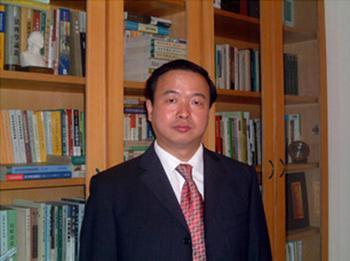In the latest poll of our Science fiction, science fact project you told us that you wanted to know what time is. Here is an answer, based on an interview with Paul Davies, a theoretical physicist and cosmologist at Arizona State University and Director of BEYOND: Centre for Fundamental Concepts in Science. Click here to see other articles on time and here to listen to our interview with Davies as a podcast.
在我们最近有关科学小说的民意调查中,科学事实项目告我我们大家最想知道的是“什么是时间”。经过采访亚利桑那州立大学的理论物理学家、宇宙学家,《超越》杂志主编Paul Davies,我们得到了想要的答案——科学概念的中心。
Everyone knows what time is. We can practically feel it ticking away, marching on in the same direction with horrifying regularity. Time has enslaved the Western world and become our most precious commodity. Turn it over to the physicists however, and it begins to morph, twist and even crumble away. So what is time exactly?
每一个人都了解什么时间。我们可以实际地感到时间的流逝。时间严格的按照它既定的规律运行,即持续性与不可逆性。时间一直被西方世界所控制,它是我们最珍贵的财富。但是在物理学家眼中,时间是可以变形的,它可以扭曲甚至崩溃。时间到底是什么呢?
To many people throughout history time would have been synonymous with the rhythms of nature; the passing of the seasons and the cycles of the celestial bodies. If this idea seems naive today, it's not only because modern clocks are infinitely more accurate time keepers than the celestial bodies ever were. It's also because we've come to think of time as something universal, something that would keep marching on even if all clocks, celestial or man-made, were to stop. The notion of an absolute time, one that's measurable and the same for all observers, was expressed most succinctly by Newton: "absolute, true and mathematical time, of itself, and from its own nature, flows equably without relation to anything external."
在历史上的,人类认为时间就像自然的旋律,季节的更替,天体的循环。这样的观点也许在今日看起来相当幼稚,那是因为现代的时钟可以对时间进行精确的记录,而天体却不能。而且我们现在也认为时间是普遍存在的东西,即使所有的时钟、所有天体,所有人造产品都停止运行,它依然一刻不停地流逝。绝对时间是可以被测量的,而且他对所有的观察者都是一样的。这一切被牛顿用简单的概念诠释为:“绝对、真实及数学的时间本身,从其性质来说,均匀流逝与此外的任何事物无关。”
Einstein's time
爱因斯坦的时间
Newton's absolute time may feel like an accurate description of the beast that rules our daily lives, but in science the notion was shattered in 1905 by Einstein's special theory of relativity. "Einstein showed that there isn't a universal time," explains Davies. "Your time and my time get out of step with each other if we move differently." In other words, the duration of time between two events can vary depending on how fast you are moving in the period between the events.
牛顿的绝对时间概念野兽般精确地定义着我们每天的生活,但是在爱因斯坦1905年发表的《狭义相对论》中,这个概念被否定了。“爱因斯坦认为这里并不存在标准时间”,Davies解释说,“你的时间和我的时间决定于我们的移动速度。”换句话说,两件事情间隔的时间根据我们在这两件事情间的移动速度来决定。

At the root of this strange time warping effect lies Einstein's postulate that the speed of light should be the same for all observers, no matter how fast they are moving. Imagine two observers, one travelling on a train and the other stationary by the side of the tracks. As the two pass each other the traveller emits a pulse of light from a torch shining vertically up. The two observers will disagree on the distance the pulse has travelled when it hits the ceiling of the train, because the stationary observer perceives not just the vertical motion of the pulse, but also the horizontal motion of the train.
实际上,根据爱因斯坦假设的时间隧道效应,光速在所有观察者眼中是不变的,无论他们移动的多快。试想两个观察者,一个正在火车上旅行,而另一个在火车旁边静止。当两个观察者垂直发射一束激光,两个个观察者会对激光照射在天花板上移动过的距离产生异议,因为静止的观察者认为激光不仅仅只有垂直速度也应该有与火车相同水平速度。
Since both observers measure the same speed of light, and since speed is distance per time, this implies that they must also disagree on the time it took the pulse to travel that distance. Time is relative to the observer, or as the physicist Kip Thorne prefers to put it, time is "personal". (For a more detailed description, read the Plus article What's so special about special relativity?.)
因为两个观察者测量的光速都是一样的,因为速度是单位时间内前进的距离,这就意味着他们对光束传播用时定义不同。时间与测量者有关就像物理学家Kip Thorne喜欢说的,时间是个人的。(如果你想知道得更多,请阅读什么是相对论。)
We don't notice this time dilation in daily life, but it's not so small as to be unmeasurable. "If I fly from Phoenix to London and back again, and then compare my clock with that left in the office, they will be out of step with each other by a few billionths of a second," says Davies. That's a tiny amount for humans, but it's well within the measuring capability of modern clocks.
在日常生活中,我们并没有感觉到这种时间膨胀,但是它并不至于小到无法测量。“如果我从凤凰城飞到伦敦再返回,然后将我的表与放在办公室的比较,他们会有十亿分之一秒的误差”戴维斯说。对人类来说这只是很小的一个数字,但是对于现代的计时技术,测量如此小的数字是易如反掌的。
In fact, time dilation has a real impact on the global positioning system (GPS), which many of us have come to rely on for navigating around the world. "The system works with orbiting satellites that are moving very fast," explains Davies. "If you didn't factor in this time distorting effect of motion, then your GPS would very quickly begin to accumulate errors so that in an hour or two you'd be lost. So this is a real effect, not just some sort of mad mathematician's nightmare."
事实上,时间膨胀对于我们大多数人都依赖的全球定位系统有着真实的影响。这套系统所使用的卫星运行速度非常高,Davies解释说,如果你没有把高速移动对时间的影响考虑进去,你们的GPS系统将很快地堆积错误,并且在一到两个小时中你就会迷路。所以时间膨胀是真实存在的,而不是某些疯狂的数学家的臆想。
But motion isn't the only thing that can distort time. In his general theory of relativity, published in 1916, Einstein showed that gravity too can slow time. Rather than thinking of gravity as an invisible force that wafts across the ether, Einstein thought of it as the effect of massive bodies distorting the very fabric of space. A famous analogy is that of a bowling ball sitting on a trampoline, which creates a dip that a nearby marble will roll into. According to general relativity, massive objects like stars and planets warp space in a similar way, and thus "attract" other bodies that pass nearby. However, Einstein realised that time and space are inextricably linked in what he called spacetime, so the warping effect of gravity does not just effect space, but also time.
其实,运动不是唯一可以是时间膨胀的东西。在他1916年发表的广义相对论中,爱因斯坦证明了重力可以减慢时间。爱因斯坦认为,重力不仅仅是一种在宇宙中不可见的力,具有巨大质量的物体可以很大程度上扭曲时空。这里有一个著名的例子,一个保龄球放在弹簧床上,如果在床上扔一块大理石,大理石会是床产生下陷,于是球会滚进去。根据广义相对论,高质量的物体例如行星,它们可以以相同的方式扭曲宇宙,同时吸引周围的其他星体。但是,爱因斯坦意识到,时间和空间是无法分割的一体,所以他称它们为时空,重力的翘曲效应不仅作用于空间,也作用于时间。
"Gravity slows time, so that it runs a little bit slower in the basement of your house than it does on the roof," says Davies. "It's a tiny effect, but it can be measured, even on distances that are that small. But if you want a seriously big time warp from gravity, you have to go where there's a very big gravitational field. If you had a clock on the surface of a neutron star, for example, it would tick at about 70% of the rate of a clock on Earth. The ultimate time warp is at the surface of a black hole, where in a sense time stands still relative to our time. If you went there, you wouldn't notice anything peculiar about time, but if you compared clocks between the two locations, they'd be enormously out of step."
“重力影响了时间,所以时间在你家地下室里要比在房顶上慢一点。” Davies说,“这种影响很小,但是仍然可以测量,即使在距离上来说它们很微小。但假如你希望重力对时间有巨大的影响,那么你就不得不去一个有着极大的重力场的地方。举个例子,假如你在中子星的表面有一个时钟,那么它的运行速度只有在地球的70%。最终极的时间扭曲发生在黑洞的表面,在那里从某种意义上说时间仍是我们的时间。如果你到了那里,你不会感觉到时间有什么特殊,但是如果你比较一下两地的时钟,它们会有相当巨大的不同。”
Einstein drew an interesting conclusion from his results about the nature of time. In a letter to the family of a recently deceased friend, Michele Besso, Einstein wrote, "... for us physicists believe the separation between past, present, and future is only an illusion, although a convincing one." Since time is relative to the observer, it is impossible to divide it up into past, present and future in a way that is universally meaningful. In some sense, past, present and future are all there at once.
爱因斯坦根据他的结果得出了一个有关自然时间的有意思的结论。在一封给最近去世的朋友Michele Besso家人的信中爱因斯坦写到:“对于我们物理学家来说,过现未来的区分只是一个幻象,尽管看起来很真实。”因为时间与观察者相关,所以我们就不能用某种即使普遍认为是有意义的方法将时间分成过去,现在,未来。从某种程度上说,过去,现在,未来都在同一时刻同一地点。
"This notion is sometimes called block time, but I like to call it the timescape because it's a bit like a landscape," says Davies. "If you look at a map, the whole of the landscape is there before you, all at once. If you add time as the fourth dimension on this map, then all of time is there at once too. The fact that nothing in physics singles out a particular 'now' is a mystery."
“这种观点有时被叫做块时间(block time),但是我喜欢叫它时间柱(timescape),因为这有一点像风景,”Davies 说,“如果你在看一个地图,那么整个风景就是摆在你面前的地图此刻的全貌,假如你在地图上定义了第四维度——时间,那么全部时间都在这里。实际上,在物理学中,‘此刻’仍然是一个迷。”
Incidentally, there is nothing in Einstein's theory that prohibits time travel, be it into the future or into the past. But this is a can of worms we won't open here, as you can read about it in Kip Thorne's Plus article Is time travel allowed? (or read Davies book How to build a time machine).
顺便一说,在爱因斯坦的理论中没有什么能阻止时间旅行,通过它可以走向未来也能回到过去。但是最麻烦的却是我们没法开启时间旅行,你可以读一读Kip Thorne 的文章Is time travel allowed。
The arrow of time
时间箭头
Thinking of past and future brings us to another problem that has foxed scientists and philosophers: why time should have a direction at all. In every day life it's pretty apparent that it does. If you look at a movie that's being played backwards, you know it immediately because most things have a distinct time direction attached to them: an arrow of time. For example, eggs can easily turn into omelettes but not the other way around, and milk and coffee mix in your cup but never separate out again.
过去和未来带给我们的另一个问题已经被科学家和哲学家解决了:为什么时间总是朝着一个方向流逝。在生活的每一天,时间箭头总是很明显地指向他的方向。假如你让电影倒带播放,你会发现任何事情都带有明显的时间方向性质,就像有东西拉着他们:时间箭头。例如,鸡蛋很容易变成鸡蛋饼,但是却不能变回鸡蛋。咖啡和牛奶在杯子中混合,但是却不能再一次把他们分开。
The most dramatic example is the history of the entire Universe, which, as scientists believe, started with the Big Bang around thirteen billion years ago and has been continually expanding ever since. When we look at that history, which includes our own, it's pretty clear which way the arrow of time is pointing.
最明显的例子就是宇宙的进化史,正如科学家所相信的,宇宙开始与130亿年前的大爆炸,从那时起宇宙开始不断膨胀。当我们审视这段包括我们自己历史的时候,我们可以很清楚的看到时间箭头所指的路。
"But the mystery is that the laws of physics show no preference for forward time or backward time," says Davies. For example, if you can make an object move one way by applying a force, then, as Newton's second law of motion tells you, you can make it retrace its path by applying the same force in the opposite direction. So when you watch a movie of this process you wouldn't be able to tell if it's being played forwards or backwards, as both are equally possible.
“但是这个迷作为物理定律置于未来和过去中间。”Davies说。例如,如果你通过一定的力是的某个物体向前移动,同时就如牛顿第二定律所描述的,你可以是把这个物体放回原位置通过在相反的方向上用相同的力量。所以当你看在电影中看到这个过程的时候,你无法分辨这是在正常播放还是在倒序播放。因为这两种情况是等可能性的。
"So the problem is how to account for the asymmetry of time in daily life when the laws that govern all the atoms that make up everything around us are symmetric in time," says Davies. Much has been made of this problem, which affects Einstein's physics just as it did Newton's classical description of the world.
Davies说:“现在的问题是如何在每天的生活中解释时间的非对称性的,尤其是这定律管理着所有原子,并将它们组成我们身边的一切,但我们身边的一切在时间中都是对称的。”这个问题很大程度上影响了爱因斯坦的物理学说就像他影响牛顿传统物理学对世界的描述一样。
But the answer isn't all that difficult to find. Most processes we feel are irreversible in time are those that (for whatever reason) start out in some very special, highly ordered state — Davies uses a pack of cards as an example. When you first open up a new pack the cards will be ordered according to suit and numerical value. When you shuffle them for a while they will become disordered, so it seems that, as time passes, things will always move from order to disorder. "We might think that this is very strange because there is nothing in the act of shuffling that chooses a direction in time, yet we see a distinct arrow," says Davies.
但是,问题的答案并不难以寻找。绝大多数我们感觉在时间上不可逆的过程不论什么原因,他们都开始于非常特别的,高度有序的状态。Davies 用了一盒扑克给我们举例子。当你刚刚打开一盒新的扑克牌是,他们按照花色和数量排好了顺序。当你洗牌的时候他们就会被打乱,所以看起来就是时间流逝,某些东西从有序变成无序。“我们可能会想,这种现象非常奇怪,因为在洗牌的时候我们没有任何动作去选择方向,但是我们可以看到时间箭头。”Davies如是说。
However, there is nothing in the laws of physics that prevents the act of shuffling from producing a perfectly ordered set of cards. It's just that the ordered state is only one of a total of around 8 × 1067 possible states, so the chance that we come across it while shuffling the cards is vanishingly small. So small that it would never happen even within several lifetimes of shuffling.
但是,这里也没有某种物理定律使得洗牌不能使扑克完美有序。完美的排序只是8 × 1067种可能性中的一种状态,所以当我们洗牌的时候,我们也是有机会把扑克完美排序的,虽然这样的机会近乎为零。所以这么小的几率也许我们洗上几辈子的牌也不一定能碰得到。
So the apparent asymmetry of time is really just an asymmetry of chance. Systems of many components — like a cup full of milk and coffee particles or a bowl full of egg particles — evolve from order to disorder not because the reverse is impossible, but because it's highly unlikely. This, in a nutshell, is the second law of thermodynamics, which states that the entropy (a measure of the disorder) in a closed physical system never decreases. It's a statistical principle, rather than a fundamental law describing the behaviour of individual atoms. The apparent arrow of time emerges as a property of the macroscopic system, but it's not there in the laws that govern the individual particle interactions. As the physicist John Wheeler put it, "If you ask an atom about the arrow of time, it will laugh in your face."
所以表面上对称的时间实际上却是不对称的几率。一个由许多部分组成的系统,例如一杯混合了牛奶的咖啡,盛满蛋清的杯子,他们从有序变成无序不是因为相反的过程不可能,而是因为概率很小。简单来说,热力学第二定律表明在一个封闭的系统中,熵是不会降低的。这是统计学原理,而不是描述单个原子行为的基本物理法则。很显然时间箭头成为了宏观系统的一种性质,但没有定律来控制单个原子间的相互作用。物理学家John Wheeler说:“如果你问一个原子时间之箭在哪里,它就会当面笑话你。”
This also applies to the whole Universe. "The Universe started out very smooth and expanding uniformly ," says Davies. From a gravitational view point the Big Bang was a low entropy state and the Universe has been increasing its entropy ever since, hence the arrow of time. The question now is why the Universe started in the way it did. "Why our Universe went bang in such an ordered state is still a mystery," says Davies. "There is no agreed answer to that, partly because there is no agreed model of cosmology. We all think the Universe began with a Big Bang and we know it's expanding. What we don't know is if the Big Bang is the ultimate origin of time or whether there was a time before that." (Read the Plus article What happened before the Big Bang? for more on this subject.)
这个道理同样应用于宇宙。Davies说:“宇宙的开始与膨胀都很平稳。”从重力学的观点来看,宇宙大爆炸时其处于低熵的状态,从那时开始因为时间箭头,宇宙的熵一直在增大。问题是为什么宇宙因大爆炸开始。“为什么我们的宇宙从一个有序的状态爆炸至今仍然是一个谜,”Davies说,“对于这个一直没有让大家共同认同的答案,一定程度上说,至今仍然没有一个可以令人信服的宇宙模型。我们都知道宇宙从大爆炸开始,也知道他在不断膨胀。我们不知道的是大爆炸是不是时间的开始或者时间在大爆炸之前就有了。”
Time disappears
时间消失
One thing we have neglected to say so far is that Einstein's theory, which describes the macroscopic world so admirably well, doesn't work for the microscopic world. To describe the world at atomic and subatomic scales, we need to turn to quantum mechanics, a theory that's fundamentally different from Einstein's. Reconciling the two, creating a theory of quantum gravity, is the holy grail of modern physics.
目前为止,有一件事被我们一直忽略,那就是爱因斯坦的理论对于宏观世界的描述非常完美,但是他的理论在微观世界就行不通了。为了描述在原子以及原子内部量级的世界,我们需要把视线引向量子力学。量子力学与爱因斯坦的理论有着本质上的不同。融合两者,我们创造出了量子引力理论,它是当代物理学的核心。
When Schrodinger and Heisenberg formulated quantum mechanics in the 1920s, they ignored Einstein's work and treated time in Newton's spirit, as an absolute that is ticking away in the background. This already gives us a clue as to why the two theories might be so hard to reconcile. The status of time in quantum mechanics has also created profound problems within the theory itself and has lead to "decades of muddle and subtlety," as Davies puts it.
当薛定谔和海森堡在二十世纪二十年代将量子力学公式化,他们无视了爱因斯坦的工作,用牛顿的思想对待时间,即时间是在不知不觉中恒定流逝的。这已经给我们稍稍解释了为什么这两种学说难以融合的原因。在量子力学中,时间概念也产生了麻烦的问题,而且导致了“几十年的混乱和微妙”,就像Davies所说。
We won't go into this muddle here, but we'll note the conundrum that unfolds when you try to apply quantum mechanics to the Universe as a whole (a rather controversial approach not all physicists agree with). "If you try to write down a quantum mechanical description of the whole Universe, you find that the time parameter actually drops out [of the equations], it's not there at all," says Davies. Time is replaced by correlations. "For example, you might have a correlation between the size of the Universe and the value of some [physical] field. We would describe this by saying 'as the Universe evolves over time and gets bigger, so this field changes in value'. We use that language, but actually all you're talking about is a correlation [between physical quantities] and time can be removed completely."
这里,我们不会陷入混乱,但是当你把宇宙看为一个整体(一种极具争议的方式,并没有的到所有物理家的赞同)并将量子力学应用于它的时候,我们将提起那些未解之谜。Davies说:“如果你想用量子力学来描述整个宇宙,你会发现时间参数在方程中消失了,它根本不存在。”时间被相关性代替了。“例如,你可能理解在某些场中宇宙的尺度与重要性的相关性。我们可以这样描述‘随着宇宙的膨胀,这个场的数量改变了’。我们用这样的语言描述它,但是事实上你们大多数在讨论物理量的相关性,所以时间可以被完全移除。
Some people have interpreted this to say that time doesn't exist at all, but Davies disagrees. "I think time exists just as telephones do. It's a real thing and we can measure it. But it does suggest that the way it enters into our description of the world is different from other quantities we're used to."
有些人如此认为时间从未存在过,但是Davies并不同意。“我认为时间是存在的就像手机是存在的。这是真实的东西,我们可以测量他。但是我们现在讨论的描述世界的方式与之前我们曾经讨论过的不同。”
One possibility is that time, and also space, are emergent properties of the Universe, which are not part of the bottom level of reality. "It may be that for the extreme conditions at the Big Bang a description in terms of other variables is more appropriate. When we see the world with a well-defined space and time [or spacetime as Einstein put it] this may just be some particular state of the Universe that has emerged out of the Big Bang." Davies uses a block of rubber as an example: it's got its very own physical properties, its elasticity for example, but these properties aren't there at the atomic level. They are a result of the atoms and the laws that govern them combining in one particular way. Similarly, the Universe, as it cooled down from the Big Bang, may have just happened to give rise to spacetime. Perhaps, if it had cooled down in another way, spacetime wouldn't have come up.
时间或者空间都可能是宇宙的一种自然性质,但二者都不是现实的组成。“这可能是对于在宇宙大爆炸时的极端条件下,依靠其他变量进行描述更加合理恰当。当我们发现世界拥有了完善的时间与空间的定义(或者如爱因斯坦所说称之为时空),那么它可能处于宇宙特别的状态,发生了大爆炸。”Davies用橡胶块举例子:它拥有自身独特的物理特性,用它的弹性举例,但是这里并没有原子尺度的道具。他们是原子结合体,根据一定的法则组合在一起。类似的,比如宇宙,当他从大爆炸中冷却下来,时空产生了。或许,如果他用另一种方式冷却下来,时空就不会存在了。
But if space and time aren't fundamental, what are the fundamental properties of the Universe? There is no theory that people agree on. "We can invent words to describe them and people have, but these things are not anything we are going to encounter in daily life. So we're just resorting to [mathematical descriptions]. But even if one day we manage to explain time and space in terms of something else, that only pushes the question to another level, because you then have to explain [the something else]."
但假如时间和空间都不是基本性质,那么什么是宇宙的基本性质呢?关于此,还没有能让大众信服的学说。“我们可以创造词汇来形容他们,但是这些并不会出现在我们的日常生活中。所以我们仍然依赖于数学描述。但是即使有一天我们希望通过某种东西去解释时间或者空间,那只不过是把问题推向了另一个层次,因为你还需要解释你解释时间用的这些东西是什么。”
So it seems that we're no closer to understanding what time is than Newton was — perhaps we understand it even less. But then, perhaps the job of the scientist isn't to fully explain the Universe, but merely to describe it. "You postulate a theory, usually in the form of mathematical equations, and then you test it against reality," says Davies. "If it does work, you don't argue where those equations come from. It's just your best attempt to describe the world."
现在,我们似乎还没有想牛顿那样理解时间,甚至可能我们理解的还要少。不过,科学家的工作并不都在解释宇宙是什么,也只有极少数可以解释的了它。“你常常是用数学方程组来假设一个理论,然后你检测他是否与现实相违背,”Davies说,“如果方程组有效,你就不必为方程组解释方程组来自哪里。这就是你解释世界最好的尝试。”
Whether it's fundamental, emergent, or just a set of correlations in disguise, the fact is that something we call time manifests itself undeniably and we all know about it. As a friend of mine put it, "If you want to know what time is, just look at my face."
无论什么是基础,意外,或者一系列的相关性,事实上,这些是我们称作时间的那个东西表现自己的方式,而且我们了解它。像一个朋友对我说的,“如果你想知道时间是什么,那就看看你自己的脸吧。”
 爱华网
爱华网



